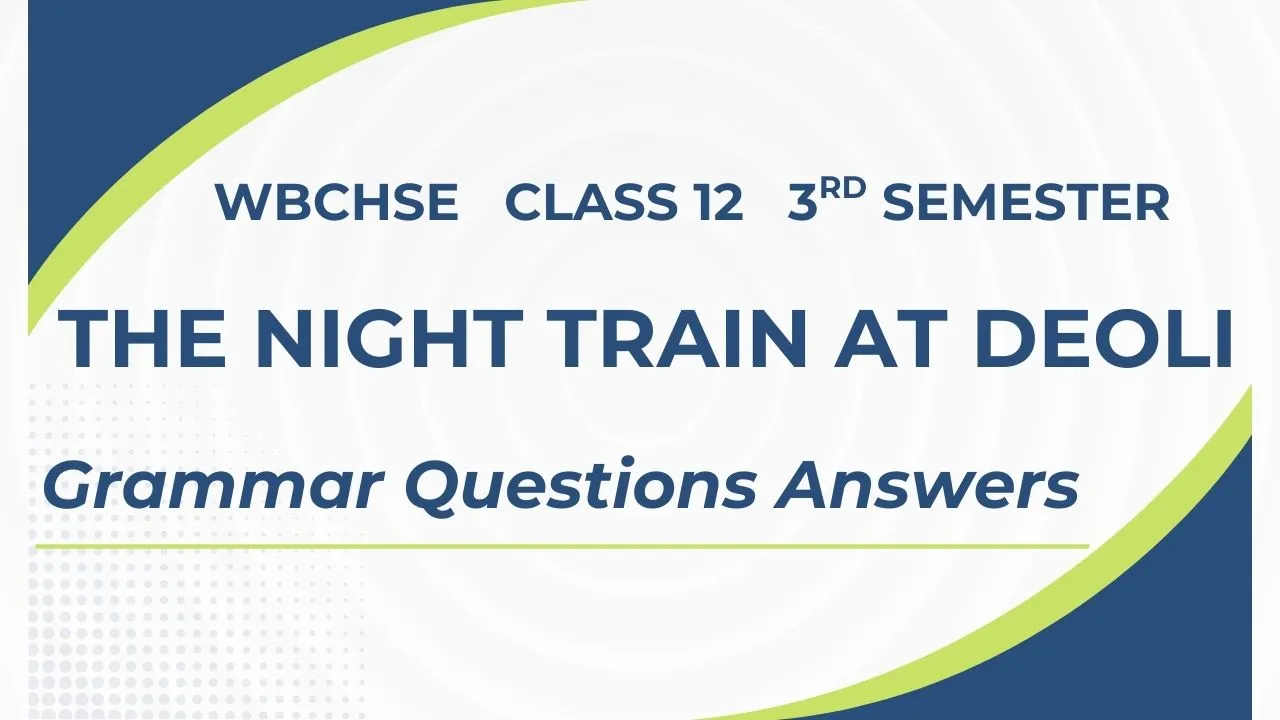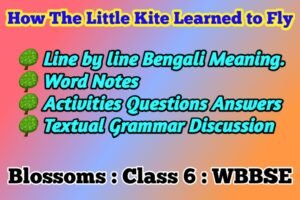This page covers The Night Train at Deoli Textual Grammar for WBCHSE Class 12 English 3rd Semester students. It covers all grammar types from the syllabus announced by WBCHSE for the 3rd semester, Textual Grammar: Synthesis, Splitting, Narration Change, and Error Correction. It is ideal for students preparing for exams with the MCQ questions based directly on the prose.
The Night Train at Deoli Textual Grammar Set 1
Do as directed:
1. He reached the station. The train had already left. (Join using a conjunction)
a. He reached the station although the train had already left.
b. He reached the station, so the train had already left.
c. He reached the station but the train had already left.
d. He reached the station because the train had already left.
Correct Answer: c
2. The girl was barefoot. Her clothes were old. She walked with dignity. (Combine the sentences)
a. The barefoot girl with old clothes walked with dignity.
b. The girl walked with dignity although barefoot and clothes old.
c. The girl, who had old clothes, was barefoot and walked with dignity.
d. The girl, barefoot and in old clothes, walked with dignity.
Correct Answer: d
| Read: The Night Train at Deoli Bengali Meaning and Summary |
| Read: The Night Train at Deoli MCQ with Answers WBCHSE |
| Read: The Night Train at Deoli Textual Grammar Class 12 3rd Sem |
3. I always felt sorry for the lonely little platform. (Split the sentence)
a. I felt sorry. The platform was lonely.
b. I felt sorry because the platform was lonely and little.
c. The platform was lonely and little. I always felt sorry for it.
d. The platform was always sorry. It looked lonely.
Correct Answer: c
4. He looked at her. She did not speak. She moved on. (Join the sentences)
a. Though he looked at her, she moved on without speaking.
b. She moved on because he looked at her and didn’t speak.
c. She spoke not. He looked and she moved.
d. He moved and looked. She didn’t speak to him.
Correct Answer: a
5. When the train stopped, I got down and looked at the tea stall. ( Split the sentence)
a. I looked at the tea stall. The train stopped.
b. I got down. I looked at the tea stall. The train stopped.
c. The train stopped. I got down. I looked at the tea stall.
d. I got down and saw. The tea stall was there.
Correct Answer: c
6. He said, “Why does the train stop at Deoli?” ( Change the mode of Narration)
a. He asked why does the train stop at Deoli.
b. He asked why the train stopped at Deoli.
c. He said why the train had stopped at Deoli.
d. He asked why did the train stop at Deoli.
Correct Answer: b
7. She said, “I will sell baskets tomorrow.” ( Change the mode of Narration)
a. She said that she would sell baskets tomorrow.
b. She said that she would sell baskets the next day.
c. She told she would sell baskets tomorrow.
d. She said I would sell baskets the next day.
Correct Answer: b
8. He said to her, “Where are you going?” ( Change the mode of Narration)
a. He asked her where was she going.
b. He told her where she was going.
c. He asked her where she was going.
d. He asked to her where she is going.
Correct Answer: c
9. The vendor said, “Do you want some tea?” ( Change the mode of Narration)
a. The vendor said that I want some tea.
b. The vendor asked if I want some tea.
c. The vendor asked whether I wanted some tea.
d. The vendor said whether I wanted tea.
Correct Answer: c
The Night Train at Deoli Textual Grammar Set 2
Do as directed:
10. He said, “I have always wondered what happens behind those station walls.” ( Change the mode of Narration)
a. He said he has always wondered what happens behind those station walls.
b. He said he had always wondered what had happened behind those station walls.
c. He said that he always wonders what happens behind those station walls.
d. He said that he had always wondered what happened behind those station walls.
Correct Answer: d
11. Deoli had only lone platform. ( Correct the error )
a. No error
b. Deoli had only lonely platform.
c. Deoli had only a lone platform.
d. Deoli had one lone platform only.
Correct Answer: c
12. She stopped and looked me intently. ( Correct the error )
a. She stopped and looked at me intently.
b. She stopped to looked me intently.
c. She stopped and looked into me intently.
d. She stopped and looked on me intently.
Correct Answer: a
13. The girl had a shawl throwed across her shoulders. ( Correct the error )
a. The girl had a shawl threw across her shoulders.
b. The girl had a shawl thrown across her shoulders.
c. The girl had a shawl throwing across her shoulders.
d. The girl had thrown a shawl across her shoulders.
Correct Answer: b
14. Nobody got off the train and nobody get in. ( Correct the error )
a. Nobody got off the train and nobody gets in.
b. Nobody got off the train and nobody got in.
c. Nobody got off the train and nobody got into.
d. Nobody get off the train and nobody got in.
Correct Answer: b
15. She had a pale skin, set off by shiny black hairs. ( Correct the error )
a. She had a pale skin, set off by shiny black hair.
b. She had pale skin, set off by shiny black hair.
c. She had pale skin set off by shiny black hairs.
d. She had a pale skin set by shiny black hair.
Correct Answer: b
16. He saw the girl. She was selling baskets. (Join using a participle)
a. He saw the girl who sold baskets.
b. He saw the girl selling baskets.
c. He saw the basket-selling girl.
d. He saw and she was selling baskets.
Correct Answer: b
17. She walked gracefully. She had bare feet and old clothes. (Join using an absolute phrase)
a. She walked gracefully though she had bare feet and old clothes.
b. Bare feet and old clothes, she walked gracefully.
c. She walked gracefully, her feet bare and her clothes old.
d. She walked and her feet were bare and her clothes old.
Correct Answer: c
18. The boy left the seat. He wanted to see her again. (Join using an infinitive)
a. The boy left the seat for seeing her again.
b. The boy left the seat for to see her again.
c. The boy left the seat to see her again.
d. The boy left the seat so as to seen her.
Correct Answer: c
19. I got off the train. I wanted to explore Deoli. (Join using a gerund)
a. I got off the train for explore Deoli.
b. I got off the train to exploring Deoli.
c. I got off the train for exploring Deoli.
d. I got off the train in exploring Deoli.
Correct Answer: c
20. The girl passed by my window. She didn’t say a word. (Join using a relative clause)
a. The girl passed by my window who didn’t say a word.
b. The girl, who didn’t say a word, passed by my window.
c. The girl didn’t say a word and passed.
d. The girl, which passed by my window, didn’t say anything.
Correct Answer: b
The Night Train at Deoli Textual Grammar Set 3
Do as directed:
21. Having finished my tea, I returned to my seat. ( Split the sentence)
a. I finished my tea. I returned to my seat.
b. I had tea and seat returned.
c. I had my tea after I returned.
d. I took tea while sitting.
Correct Answer: a
22. The train reached Deoli when the platform was dimly lit. ( Split the sentence)
a. The platform was dimly lit. The train had not arrived.
b. The train reached Deoli. The platform was dimly lit.
c. When Deoli came, the platform was dark.
d. The train reached. The light was dim on the platform.
Correct Answer: b
23. Feeling curious, I stepped onto the platform to look around. ( Split the sentence)
a. I felt curious. I stepped onto the platform. I looked around.
b. I felt curiosity and stepped onto the platform.
c. I stepped onto the platform and looked curiosity.
d. I stepped and saw the platform with curiosity.
Correct Answer: a
24. He was a boy of eighteen who was visiting his grandmother. (Split the sentence)
a. He was eighteen. He visited his grandmother.
b. He was a boy. He was visiting his grandmother. He was eighteen.
c. He was eighteen. He was a boy. He was visiting his grandmother.
d. He was a boy of eighteen. He was visiting his grandmother.
Correct Answer: d
25. The jungle across the track was visible in the faint light of dawn. ( Split the sentence)
a. The light was faint. The jungle was visible.
b. The jungle was across the tracks. It was dawn. It was faint.
c. It was dawn. The light was faint. The jungle across the tracks was visible.
d. The dawn had light. The jungle looked across the tracks.
Correct Answer: c
26. She smiled. She was pleased that I remembered her. ( Join the sentences)
a. She smiled because she remembered me.
b. Smiling, she remembered me.
c. She smiled as she was pleased that I remembered her.
d. She smiled for I had forgotten her.
Correct Answer: c
27. I gave her a rupee. I hardly dared to touch her fingers. ( Join the sentences)
a. I gave her a rupee, hardly daring to touch her fingers.
b. I gave her a rupee, daring not to touch her fingers.
c. I hardly dared and gave her a rupee.
d. I touched her fingers and gave a rupee.
Correct Answer: a
28. She came to the tea stall. Her eyes were filled with light. ( Join the sentences)
a. She came to the tea stall, her eyes filling with light.
b. Coming to the tea stall, her eyes were filled with light.
c. She came to the tea stall and her eyes were filled with light.
d. Her eyes were filled with light as she came to the tea stall.
Correct Answer: d
29. I sat up awake. I could not rid my mind of her face. ( Join the sentences)
a. I sat up awake and could not rid my mind of her face.
b. Sitting up awake, her face remained in my mind.
c. I was awake sitting, her face on my mind.
d. I sat and awake was her face.
Correct Answer: a
30. She did not move. She was looking at me and smiling. ( Join the sentences)
a. She did not move but looked and smiled.
b. She did not move, but she was looking at me and smiling.
c. She moved not, smiling and looking.
d. She did not move or look.
Correct Answer: b
31. As she was about to speak, the guard blew his whistle. (Split the sentence)
a. The guard blew his whistle. She was about to speak.
b. She spoke. The guard whistled.
c. The guard blew. She didn’t speak.
d. The guard’s whistle was loud.
Correct Answer: a
32. The platform slipped away as I watched her. (Split the sentence)
a. I watched her. The platform slipped away.
b. I slipped away. She watched.
c. She slipped the platform.
d. Watching her was platform slipped.
Correct Answer: a
33. The jungle hid the station though I could still see her standing alone. (Split the sentence)
a. The jungle hid the station. I could still see her standing alone.
b. I saw the jungle. I hid the station.
c. She stood alone in the jungle.
d. The station stood behind the jungle.
Correct Answer: a
34. I felt an unexpected thrill when I saw her walking up the platform. (Split the sentence)
a. I saw her walking up the platform. I felt an unexpected thrill.
b. She thrilled me. She was on the platform.
c. I thrilled. She walked.
d. I walked with her thrilling sight.
Correct Answer: a
35. She put out her hand for a basket, but I caught it and held it. (Split the sentence)
a. She put out her hand. I caught and held it.
b. I held her basket. She put it out.
c. She caught my hand. I held the basket.
d. I gave her a hand and she put the basket out.
Correct Answer: a
36. She asked, “Do you want to buy a basket?” ( Change the mode of narration)
a. She asked if I want to buy a basket.
b. She asked if I wanted to buy a basket.
c. She asked did I want to buy a basket.
d. She asked that I wanted a basket.
Correct Answer: b
37. “All right, give me one,” I said. ( Change the mode of narration)
a. I said to give him one.
b. I said that give me one.
c. I said that she should give me one.
d. I said all right and gave one.
Correct Answer: c
38. “Will you be here?” I asked. ( Change the mode of narration)
a. I asked will you be here.
b. I asked if she is here.
c. I asked if she would be there.
d. I asked if she will be here.
Correct Answer: c
39. “I have to go to Delhi,” I said. ( Change the mode of narration)
a. I said I had to go to Delhi.
b. I said that I has to go to Delhi.
c. I said I have to Delhi go.
d. I said that I must Delhi go.
Correct Answer: a
40. She said, “I do not have to go anywhere.” ( Change the mode of narration)
a. She said that she did not have to go anywhere.
b. She said that she does not have to go anywhere.
c. She said she have to go nowhere.
d. She told she would not go any.
Correct Answer: a
The Night Train at Deoli Textual Grammar Set 4
Do as directed:
41. I said, “I will come again.” ( Change the mode of narration)
a. I said I would come again.
b. I said that I will came again.
c. I said that I can come again.
d. I said I will again come.
Correct Answer: a
42. She said something, but it was lost in the noise. (Transform into indirect speech)
a. She said something that was lost in the noise.
b. She told that it was lost in noise.
c. She told something but it has gone.
d. She told a thing, and it is not heard.
Correct Answer: a
43. She followed me behind the stall. ( Correct the error)
a. No error
b. Remove “behind”
c. Change “followed” to “follow”
d. Replace “me” with “mine”
Correct Answer: b
44. Her dark eyes were suddenly fill with light. ( Correct the error)
a. Replace “fill” with “filled”
b. Replace “with” with “by”
c. Use “filling”
d. No error
Correct Answer: a
45. We couldn’t have been more eloquent. ( Correct the error)
a. Use “could” instead of “couldn’t”
b. Replace “eloquent” with “silent”
c. No error
d. Add “than this”
Correct Answer: c
46. She was pleased that, she remembered me. ( Correct the error)
a. Remove the comma after “that”
b. Replace “that” with “because”
c. Use “pleasure” instead of “pleased”
d. No error
Correct Answer: a
47. I caught her hand and hold it. ( Correct the error)
a. Change “hold” to “held”
b. Change “caught” to “catch”
c. Change “her” to “hers”
d. No error
Correct Answer: a
48. I sat up awake for rest of the journey. ( Correct the error)
a. Insert “the” before “rest”
b. Replace “rest” with “remain”
c. Add “and” before “awake”
d. No error
Correct Answer: a
49. I felt the impulse to put her in the train. ( Correct the error)
a. Use “on the train” instead of “in the train”
b. Use “impulsion” instead of “impulse”
c. Replace “put” with “push”
d. No error
Correct Answer: a
50. She nodded again. The bell clanged. (Join the following pairs of sentences)
A. She nodded again, so the bell clanged.
B. She nodded again because the bell clanged.
C. She nodded again and the bell clanged.
D. She nodded again while the bell clanged.
Answer: D
The Night Train at Deoli Textual Grammar Set 5
Do as directed:
51. I opened the door. I stepped off the footboard. (Join the following pairs of sentences)
A. I opened the door and stepped off the footboard.
B. I opened the door then I stepped off the footboard.
C. I stepped off the footboard opening the door.
D. I had stepped off the footboard after opening the door.
Answer: A
52. I found the owner of the tea stall. I asked him about the girl. (Join the following pairs of sentences)
A. I found the owner of the tea stall who I asked about the girl.
B. Finding the owner of the tea stall, I asked him about the girl.
C. The owner was found and asked about the girl by me.
D. I found and asked the owner of the tea stall.
Answer: B
53. The train came to Deoli. I looked up and down the platform. (Join the following pairs of sentences)
A. As the train came to Deoli, I looked up and down the platform.
B. The train came, and so I looked at Deoli.
C. Looking at the platform, the train arrived at Deoli.
D. The train came after I looked at the platform.
Answer: A
54. She sold baskets. She was a girl. (Join the following pairs of sentences)
A. She sold baskets and was a girl.
B. The girl was selling baskets.
C. She was a girl who sold baskets.
D. She sold baskets, that was a girl.
Answer: C
55. I was nervous. I was anxious. (Join the following pairs of sentences)
A. I was nervous and anxious.
B. I was nervous but anxious.
C. I was nervous or anxious.
D. I was nervous therefore anxious.
Answer: A
56. I was determined. I wouldn’t stand helplessly before her. (Join the following pairs of sentences)
A. I was determined but wouldn’t stand helplessly.
B. I wouldn’t stand helplessly before her because I was determined.
C. I was determined not to stand helplessly before her.
D. I was determined, so I stood helplessly.
Answer: C
57. I packed in haste and left for Dehra earlier than usual. (Split the following compound/complex sentences)
A. I packed. I left for Dehra.
B. I packed in haste. I left for Dehra earlier than usual.
C. I packed and I was in haste.
D. I was leaving. I packed.
Answer: B
58. He said he did not know the girl. (Split the following compound/complex sentences)
A. He knew the girl. He said this.
B. He said something. He did not know the girl.
C. He said something. It was about the girl.
D. He said something. He did not know the girl.
Answer: D
59. I stared over the railings at the station yard. (Split the following compound/complex sentences)
A. I stared. The railings were there.
B. I stared. The station yard was beyond the railings.
C. I stared over the railings. I looked at the station yard.
D. I stared. Over the railings, the yard stared back.
Answer: C
60. The train gathered speed and rushed through the forests. (Split the following compound/complex sentences)
A. The train rushed through the forests. It gathered speed.
B. The train rushed. The forests were gathered.
C. The train gathered speed. It rushed through the forests.
D. The forests were rushed by the speeding train.
Answer: C
The Night Train at Deoli Textual Grammar Set 6
Do as directed:
61. She was a bright, living thing and stayed with me for long. (Split the following compound/complex sentences)
A. She was a bright, living thing. She stayed with me for long.
B. She stayed with me. She was living.
C. She was bright. She stayed long.
D. She lived bright. She was long.
Answer: A
62. I had seen her only twice and knew nothing about her. (Split the following compound/complex sentences)
A. I had seen her. I knew nothing about her.
B. I saw her twice. I had no idea.
C. I had seen her only twice. I knew absolutely nothing about her.
D. I had seen her. I knew not much.
Answer: C
63. The previous man had been transferred within the past week. (Split the following compound/complex sentences)
A. The previous man was transferred. It was within the week.
B. The previous man was gone. A week passed.
C. The previous station-master was transferred. That happened last week.
D. The previous man had left. He was transferred last week.
Answer: D
64. I asked him, “Do you know the girl with the baskets?” (Turn into indirect speech)
A. I asked him if he knew the girl with the baskets.
B. I asked him did he know the girl.
C. I asked him to know the girl with the baskets.
D. I asked him he knew the girl.
Answer: A
65. He said, “She has stopped coming now.” (Turn into indirect speech)
A. He said she had stopped coming then.
B. He told she has stopped coming.
C. He said she stops coming.
D. He said she has come no more.
Answer: A
66. “Why?” I asked. (Turn into indirect speech)
A. I asked why.
B. I asked that why.
C. I asked him why.
D. I had asked him why.
Answer: C
67. I said, “What happened to her?” (Turn into indirect speech)
A. I said what happened to her.
B. I asked what had happened to her.
C. I told what was happening to her.
D. I asked what has happened to her.
Answer: B
68. “She was nothing to me,” said the man. (Turn into indirect speech)
A. The man said that she was nothing to him.
B. The man said she is nothing to him.
C. The man said she was nothing to me.
D. The man told she was nothing.
Answer: A
69. The station-master said, “You’d better get on the train.” (Turn into indirect speech)
A. The station-master advised that I had better get on the train.
B. The station-master said I better get on.
C. The station-master told me to get the train better.
D. The station-master said to get on the train.
Answer: A
70. I said, “Do you remember the girl?” (Turn into indirect speech)
A. I asked if he remembered the girl.
B. I said he should remember the girl.
C. I asked that he remembered the girl.
D. I said do you remember the girl.
Answer: A
The Night Train at Deoli Textual Grammar Set 7
Do as directed:
71. I had to wrench my hand away from the girl and run for the moving train. (Correct the grammatical error in the sentence.)
A. No error
B. wrench → wrenched
C. run → ran
D. hand → hands
Answer: C
72. She was a bright, living thing. (Correct the grammatical error in the sentence.)
A. was → had been
B. living → alive
C. No error
D. bright → brighter
Answer: C
73. My grandmother would be pleased at my eagerness to see her. (Correct the grammatical error in the sentence.)
A. pleased → pleasing
B. to see → seeing
C. No error
D. at → by
Answer: C
74. I was determined that I wouldn’t stand helplessly before her. (Correct the grammatical error in the sentence.)
A. wouldn’t → didn’t
B. that → whether
C. No error
D. stand → standing
Answer: C
75. The new man didn’t knew anything about the girl who sold baskets. (Correct the grammatical error in the sentence.)
A. knew → know
B. sold → sell
C. anything → something
D. new → knew
Answer: A
76. She was nothing to me. (Correct the grammatical error in the sentence.)
A. was → is
B. to me → for me
C. No error
D. nothing → none
Answer: C
77. The train was moving out of the station, and I had to run up the platform and jump for the door. (Correct the grammatical error in the sentence.)
A. for the door → into the door
B. moving → moved
C. had to → have to
D. No error
Answer: D
78. He was afraid. He did not break his journey at Deoli. ( Choose the correct joining sentence)
A. As he was afraid, he did not break his journey at Deoli.
B. He was afraid but he broke his journey at Deoli.
C. He did not break his journey, because he was not afraid.
D. Being not afraid, he broke his journey.
Correct Answer: A
79. I passed through Deoli many times. I never broke my journey. ( Choose the correct joining sentence)
A. Though I passed through Deoli, I never broke my journey.
B. I passed through Deoli as I broke my journey.
C. I passed through Deoli where I broke my journey.
D. I passed through Deoli and broke my journey every time.
Correct Answer: A
80. I looked up and down the platform. I hoped to find the girl. ( Choose the correct joining sentence)
A. Looking up and down the platform, I hoped to find the girl.
B. I looked and hoped to find the platform.
C. The platform was looking and I hoped for the girl.
D. Though I found the girl, I looked up and down.
Correct Answer: A
The Night Train at Deoli Textual Grammar Set 8
Do as directed:
81. I would have broken my journey. I would have discovered the truth. ( Choose the correct joining sentence)
A. If I had broken my journey, I would have discovered the truth.
B. I broke my journey to discover the truth.
C. I would discover the truth only after breaking the journey.
D. Because I broke the journey, the truth was discovered.
Correct Answer: A
82. I was afraid of discovering what really happened to the girl. (Choose the correct split sentence)
A. I was afraid. I might discover what really happened to the girl.
B. I discovered the girl. She was afraid.
C. The girl was afraid. She discovered the truth.
D. What really happened to the girl was not known.
Correct Answer: A
83. I couldn’t bring myself to break journey at Deoli and spend a day there. (Choose the correct split sentence)
A. I couldn’t break the journey. I couldn’t spend a day there.
B. I didn’t want to go. Deoli was far.
C. I brought myself to Deoli. I spent a day.
D. I journeyed through Deoli. I stayed a week.
Correct Answer: A
84. He consoled himself throughout the last term with the thought. (Choose the correct split sentence)
A. He had a thought. It consoled him.
B. He consoled himself. The thought helped him.
C. The thought consoled him. It remained throughout his last term.
D. He consoled the girl. The term ended.
Correct Answer: C
85. I decided to break my journey at Deoli and find the girl. (Choose the correct split sentence)
A. I made a decision. I would break my journey and find the girl.
B. I broke the journey. I decided to find a girl.
C. I broke at Deoli. I found my journey.
D. The girl decided. The journey broke.
Correct Answer: A
86. I asked, “Why has she stopped coming?” (Choose the correct indirect speech)
A. I asked why she had stopped coming.
B. I asked why she has stopped coming.
C. I asked why did she stop coming.
D. I asked why had she stopped to come.
Correct Answer: A
87. The tea-stall owner said, “She was nothing to me.” (Choose the correct indirect speech)
A. The tea-stall owner said that she had been nothing to him.
B. The tea-stall owner said she is nothing to him.
C. The tea-stall owner said that she has been nothing to him.
D. The tea-stall owner said that she is not important to him.
Correct Answer: A
88. He said, “Perhaps she is married.” (Choose the correct indirect speech)
A. He said that perhaps she was married.
B. He said that she may be married.
C. He said that she has been married.
D. He said that she is perhaps married.
Correct Answer: A
89. The man said, “She has stopped coming now.” (Choose the correct indirect speech)
A. The man said that she had stopped coming then.
B. The man said she stops coming now.
C. The man said that she has stopped coming.
D. The man said that she had stopped to come now.
Correct Answer: A
The Night Train at Deoli Textual Grammar Set 9
Do as directed:
90. I decided that one day I _____ have to break journey there.
A. will
B. would
C. shall
Correct Answer: B
91. In the last few years, I _____ passed through Deoli many times.
A. have
B. has
C. had
Correct Answer: A
92. I always look out of the carriage window, half _____ to see the same face.
A. expecting
B. expected
C. expects
Correct Answer: A







